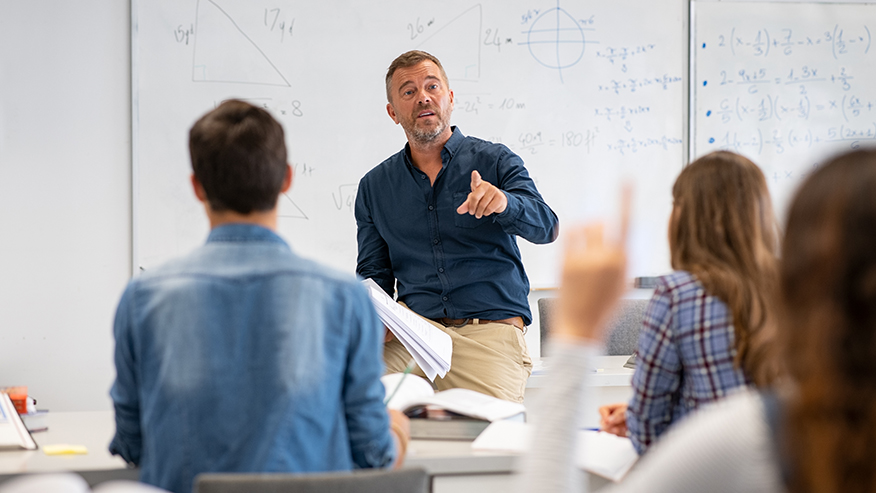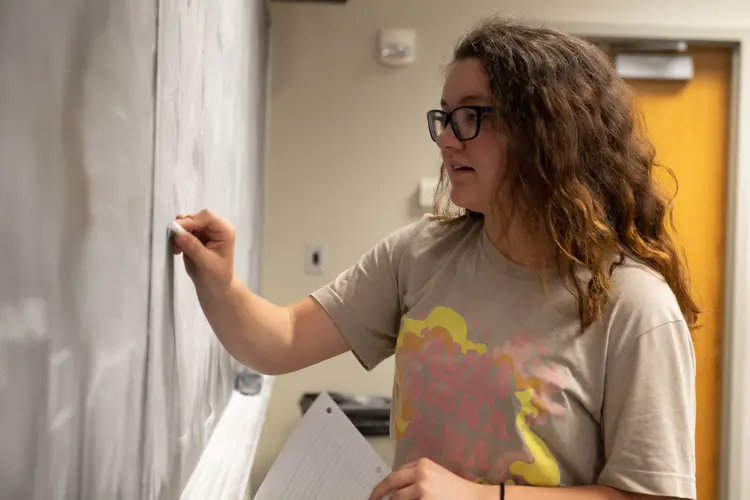How qualified math teachers build student confidence through personalized learning
Wiki Article
Everything About Certified Mathematics Teachers: Their Function in Fostering Trainee Growth and Accomplishment in Math Education
Certified mathematics teachers are vital fit trainees' understanding and admiration of maths. Their deep expertise and reliable training approaches can greatly influence trainee outcomes. These instructors not just impart mathematical skills but also promote a comprehensive atmosphere that satisfies varied finding out needs. As they adopt ingenious techniques, the concern emerges: how do these methods specifically improve trainee engagement and accomplishment in math?The Significance of Qualified Mathematics Teachers in Education
Many aspects add to pupil success in mathematics, the existence of qualified mathematics teachers stands out as a crucial element in fostering efficient understanding atmospheres. Research study regularly suggests that trainees instructed by instructors with solid mathematical histories often tend to demonstrate higher levels of understanding and achievement. Certified mathematics educators not just possess a deep understanding of mathematical concepts however additionally the instructional skills needed to share complicated ideas in easily accessible ways. They can recognize students' individual needs and adjust their teaching techniques accordingly, advertising inclusivity and interaction. Furthermore, their experience enables them to produce a favorable class environment that motivates risk-taking and strength in analytical. This encouraging atmosphere promotes a growth attitude among students, enhancing their self-confidence and inspiration in mathematics. On the whole, qualified math educators play an essential function fit trainees' perspectives toward math, ultimately affecting their future possibilities and academic trajectories.Secret Qualities of Reliable Math Educators
Efficient mathematics teachers have numerous vital high qualities that boost their training effectiveness. These consist of deep subject understanding, solid communication skills, and adaptive training approaches that deal with diverse learning requirements. Acknowledging and cultivating these attributes can greatly impact student understanding and engagement in mathematics.Deep Topic Knowledge
While a solid pedagogical approach is very important, deep subject knowledge remains a keystone of efficient math instructors. Such understanding makes it possible for instructors to understand mathematical ideas completely and to expect student misunderstandings. Educators with a solid grasp of mathematics not just deliver content with confidence however additionally link various topics, cultivating a richer learning setting. They are equipped to use varied training strategies that accommodate various understanding designs, making complicated ideas much more obtainable. Deep subject expertise equips instructors to involve in meaningful discussions with students, motivating critical reasoning and analytic skills. Eventually, the depth of comprehending that mathematics educators have significantly affects trainees' scholastic growth and achievement in maths, laying a strong structure for future discovering.
Strong Interaction Abilities
Deep subject understanding alone is inadequate for fostering a productive learning setting in maths; solid communication skills are similarly essential for efficient math educators. These skills enable instructors to convey complex concepts in accessible methods, ensuring that pupils comprehend fundamental ideas. Efficient interaction includes not only clarity but additionally the capability to actively pay attention, urging pupil participation and resolving mistaken beliefs. By cultivating an open dialogue, teachers create an encouraging classroom ambience where pupils really feel comfortable asking questions and expressing their ideas. In addition, strong communicators can adapt their language and descriptions to suit varied learning designs, boosting pupil engagement and comprehension. Ultimately, efficient communication bridges the space in between a teacher's expertise and a trainee's understanding, significantly affecting scholastic achievement in mathematics.Flexible Teaching Approaches
A variety of adaptive mentor strategies are important for efficient math teachers intending to meet the diverse requirements of their students. These techniques make it possible for educators to tailor their instruction based upon specific learning capabilities, styles, and interests. qualified math teachers. Strategies such as distinguished direction, where teachers modify procedure, material, or item, help address differing proficiency degrees. In addition, including technology and interactive devices can enhance engagement and promote customized knowing experiences. Developmental analyses permit teachers to check development and readjust mentor methods accordingly. Joint group work promotes peer understanding, promoting a supportive setting. By utilizing these adaptive strategies, math educators can create inclusive class that motivate all students to grow and achieve their academic goals, inevitably cultivating a love for mathematicsIngenious Training Techniques Utilized by Math Teachers
As instructors look for to engage trainees more effectively, cutting-edge training methods have become a focal factor in math class. These techniques intend to boost understanding and retention of mathematical ideas. One popular method is making use of technology, such as interactive software and online simulations, which enables trainees to envision intricate problems and get prompt feedback.Additionally, project-based learning encourages collaboration and real-world application of math principles, fostering important assuming abilities. Gamification, where math ideas are integrated into game-like environments, has likewise gotten popularity, making finding out more satisfying and inspiring for students.Moreover, set apart instruction tailors lessons to accommodate varying skill levels, making sure that all pupils can proceed at their very own rate. By employing these ingenious approaches, mathematics instructors create dynamic knowing experiences, eventually promoting higher pupil growth and accomplishment in mathematics.Developing Inclusive Knowing Settings
Developing inclusive understanding environments in maths education and learning entails applying diverse learning methods and promoting collaborative team activities. These methods accommodate the varied needs of trainees, guaranteeing that every person has the possibility to succeed and engage. By prioritizing inclusivity, mathematics educators can cultivate a class environment that supports all students.Varied Understanding Strategies
While many teachers venture to promote inclusive knowing atmospheres, applying varied discovering strategies is crucial for successfully reaching all trainees. These techniques include a range of training techniques tailored to suit varying discovering backgrounds, capacities, and styles. For instance, click here for more incorporating visual help, manipulatives, and modern technology can engage pupils who may battle with conventional guideline. Furthermore, set apart instruction enables instructors to modify assessments and tasks, making sure that every pupil can access the curriculum at their very own degree. Culturally responsive pedagogy likewise plays a substantial role in acknowledging and valuing the varied experiences of trainees, therefore enhancing their connection to the product. By using these diverse knowing approaches, qualified math teachers can develop a helpful atmosphere where all students are encouraged to succeed in maths.Collaborative Team Activities

The Impact of Competent Mathematics Teachers on Student Achievement
The presence of qualified math teachers considerably affects student accomplishment, as effective direction can connect voids in understanding learn this here now and cultivate a positive discovering setting. Research study shows that trainees shown by seasoned instructors demonstrate greater degrees of efficiency in mathematical principles compared to their peers. Qualified mathematics educators possess a deep understanding of mathematical material, enabling them to existing product in diverse methods that satisfy different discovering styles. This flexibility not just improves understanding but additionally improves trainee confidence in their abilities.Moreover, qualified teachers frequently employ developmental assessments to monitor student progress, enabling for timely treatments when required. Their capacity to create engaging lessons motivates trainee participation and advertises a growth way of thinking. As an outcome, the impact of certified mathematics instructors expands beyond simple academic efficiency; it grows a sense of inquisitiveness and resilience in trainees, eventually resulting in boosted outcomes in mathematics and a more powerful structure for future learning.Strategies for Engaging Students in Math
Involving trainees in mathematics calls for a diverse method that incorporates varied strategies to catch their passion and boost understanding. One effective method is using real-world applications, allowing students to see the importance of mathematical ideas in everyday life. Integrating technology, such as interactive software application and on the internet sources, can additionally promote engagement by offering dynamic knowing experiences.Group work encourages partnership, making it possible for students to gain from one another and create analytical abilities in a supportive environment. In addition, including video games and hands-on tasks can make discovering more satisfying and accessible.Differentiated instruction caters to various discovering styles, ensuring that all students can link with the product. Providing prompt feedback helps students identify their development and areas for renovation, cultivating a development frame of mind. By using these methods, teachers can develop an engaging mathematics class that promotes trainee growth and achievement.The Role of Specialist Advancement in Enhancing Mathematics Training Abilities
While lots of educators identify the value of effective mentor strategies, professional advancement plays an important duty in boosting math mentor abilities (qualified math teachers). Continuous training opportunities allow educators to remain existing with instructional developments, mathematical material, and technical devices. Seminars and workshops supply discussion forums for teachers to work together, share finest techniques, and discuss difficulties they come across in the classroom.Furthermore, expert growth cultivates a development attitude among educators, motivating them to review their methods and adjust their techniques based upon student requirements. This ongoing learning process not just boosts instructors' mathematical understanding yet additionally outfits them with ingenious educational techniques that can find out here result in enhanced student interaction and achievement.Ultimately, an organized professional growth program can substantially impact the top quality of math education, ensuring that educators are well-prepared to inspire and lead their trainees towards success in mathsOften Asked Inquiries
What Certifications Are Needed to End Up Being a Math Educator?
To come to be a math teacher, people commonly require a bachelor's level in maths or education, teaching qualification, and a solid understanding of mathematical principles. Added certifications may consist of specialized training in pedagogy and classroom management skills.How Do Math Teachers Assess Trainee Progression in the Class?
Mathematics educators analyze student development with various approaches, consisting of jobs, examinations, and quizzes (qualified math teachers). They likewise make use of observational analyses and trainee engagement to determine understanding, readjusting instruction based on individual and team efficiency to boost finding out end resultsWhat Obstacles Do Mathematics Educators Typically Face?
Mathematics educators typically face obstacles such as varying trainee skill degrees, minimal resources, curriculum restrictions, and the need to involve trainees properly. In addition, they usually run into stress to boost standardized test ratings and manage class habits.Exactly How Can Parents Assistance Their Kid's Math Education?
Moms and dads can sustain their child's math education and learning by providing a favorable understanding atmosphere, taking part in math-related tasks, encouraging a favorable perspective in the direction of difficulties, and preserving open communication with teachers to monitor progression and address concerns.What Resources Are Offered for Mathematics Teachers to Improve Their Abilities?
Various resources are readily available for mathematics teachers, consisting of online training courses, specialist growth workshops, peer collaboration groups, educational web sites, and teaching journals. These tools improve educational techniques, strengthen subject expertise, and inevitably enhance pupil learning outcomes in mathematics. Certified math teachers are vital in shaping students' understanding and gratitude of maths. Many elements contribute to pupil success in mathematics, the existence of certified math teachers stands out as a critical component in promoting reliable knowing environments. Furthermore, qualified mathematics educators promote these communications by purposefully organizing students, guaranteeing that each group includes a mix of ability degrees and backgrounds. The existence of qualified mathematics teachers substantially influences student achievement, as effective guideline can bridge gaps in understanding and promote a favorable understanding setting. Mathematics educators frequently deal with challenges such as differing pupil skill degrees, restricted resources, educational program restraints, and the requirement to engage pupils properly.Report this wiki page